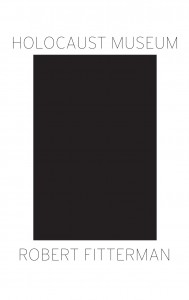Holocaust Museum
Robert Fitterman
Purchase print copies here, or write to counterpath@gmail.com.
Holocaust Museum reframes the captions of holocaust photographs from the United States Holocaust Memorial Museum in Washington, DC. These captions—without their photographic images—are arranged loosely in the order or narrative constructed by the museum. There are many purposes to this project but the genesis is in articulating a cultural shift from image to text. The subject, this particular holocaust, was chosen because the images are shared in our collective memory—by presenting only the text, the reader is, hopefully, consigned into a more complicit experience.
Nick Thurston reviews Holocaust Museum in Flux Magazine.
“The powerful effect of this remarkable project is realized most acutely only after one has read dozens or hundreds of items on the lists. We begin, blearily, weakly, to be conscious of the upsetting juxtapositions. Of course the holocaust archive is loaded ipso facto with dramatic ironies, especially the prewar materials. The caption of a photo can read like a conventional imagistic poem: “A group of young people pose outdoors in the snow.” One could write whole interpretive pages—traditional poetic close reading—on that line. That, too, would be upsettingly ironic. To the extent that the holocaust encompassed everything, Holocaust Museum responds to the problem of representation by making precisely everything its object.” —Al Filreis
“According to a dictionary, a museum is a site where objects of permanent value are kept and displayed. The permanent value of the objects captured in Robert Fitterman’s Holocaust Museum is that they prove the cut an image can make. The image of a Jew, a gypsy, a desecration, a desire. We have seen the pictures of our past, but the point is the caption. For it is through the language of this museum that we can see how permanent, how precious, is our love of hate.”
—Vanessa Place
“Robert Fitterman’s Holocaust Museum is a remarkable book for several reasons. It enters a moment in history in which the images of that world have become so familiar that we are no longer able to see it clearly—and/or so horrific that we are unable to see it at all. Holocaust Museum reminds us how the everyday and the awful are intertwined, how words have an extraordinary power to make things new, and to write a news that (of course) stays news. Also—& differently—Holocaust Museum is noteworthy because it demonstrates how contemporary poetry (however it gets labeled) can engage with the world in a profound, universal, and original manner, absolutely the equal of the great, enduring works of poetry of any location or era.” —Tim Atkins
Robert Fitterman is the author of 12 books of poetry, including his long poem Metropolis, which has been published in 4 volumes; other titles include: now we are friends (Truck Books, 2010), Rob the Plagiarist (Roof Books, 2009), and Notes on Conceptualisms, co-authored with Vanessa Place (Ugly Duckling Presse, 2009). His writing has been described as: radical appropriation that aims to critique institutions by repurposing the languages of those institutions (corporate, technological, consumerist). Additionally, his poetry continues to shop for: “the best deals and most provocative experiences.” He is the founder of Collective Task—a collective of over 20 artists and writers, and he has collaborated with several visual artists including: Tim Davis, Nayland Blake, Dirk Rowntree, Cheryl Donegan, Penelope Umbrico, Klaus Killisch, and others. He teaches writing and poetry at New York University and at the Bard College, Milton Avery School of Graduate Studies.
Holocaust Museum
September 16, 2013
Robert Fitterman
$20.00; 6.5 x 8″
144 pgs.
ISBN 978-1-933996-37-0
Purchase print copies here, or write to counterpath@gmail.com.


